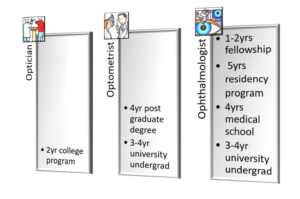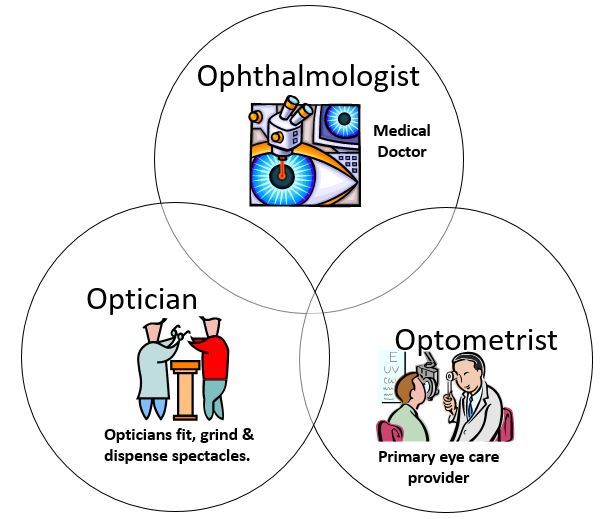Ophthalmology is the branch of medicine that deals with the medical and surgical treatments of the eye.
Ophthalmologist
An ophthalmologist is a medical doctor (MD and FRCSC) and they differ from optometrists and opticians in their levels of training and in what they can diagnose and treat. Ophthalmologists are leaders of the eye care team due to their length of training and specialization.
An ophthalmologist has completed a 3-4-year university degree and at least eight years of additional medical training, and are licensed to practice medicine and surgery. This advanced training allows ophthalmologists to diagnose and treat a wider range of conditions than optometrists and opticians. For this reason, they are considered to be both surgical and medical specialists.
An ophthalmologist diagnoses and treats all eye diseases, performs eye surgery and prescribes and fits eyeglasses and contact lenses to correct vision problems. Because they are medical doctors, ophthalmologists can sometimes recognize other health problems that aren’t directly related to the eye, and refer those patients to the right medical doctors for treatment.

While ophthalmologists are trained to care for all eye problems and conditions, many ophthalmologists specialize in a specific area of medical or surgical eye care. This person is called a sub-specialist. He or she usually completes one or two years of additional, more in-depth training called a fellowship in one of the main sub-specialty areas such as glaucoma, medical retina, surgical retina, cornea, pediatrics, neuro-ophthalmology, uveitis, oculoplastic, and low vision as well as others. This added training and knowledge prepares an ophthalmologist to take care of more complex or specific conditions in certain areas of the eye or in certain groups of patients.
Many ophthalmologists are also involved in scientific research on the causes and cures for eye diseases and vision disorders.
The Differences
Optometrist
Optometrists are healthcare professionals who provide primary vision care ranging from sight testing and correction to the diagnosis, treatment, and management of vision changes. An optometrist is not a medical doctor. An optometrist receives a doctor of optometry (OD) degree after completing four years of optometry school, preceded by three years or more years of university. They are licensed to practice optometry, which primarily involves performing eye exams and vision tests, prescribing and dispensing corrective lenses, detecting certain eye abnormalities, and prescribing certain medications for some eye diseases.
Optician
Opticians are technicians trained to design, verify and fit eyeglass lenses and frames, contact lenses, and other devices to correct eyesight. They use prescriptions supplied by ophthalmologists or optometrists, but do not test vision or write prescriptions for visual correction. Opticians are not permitted to diagnose or treat eye diseases.


